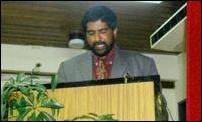Security and land Tamils' chief concern – Minister
[TamilNet, Thursday, 16 October 2003, 17:13 GMT]
“The Singhalese should decide whether we are going to have a united Sri Lanka or Eelam and Sri Lanka. The peace process may take years. But the conflict should be resolved before the next elections”, said Dr. Rajitha Senaratne, Minister of Lands, speaking at a workshop on ‘Devolution of Power: To what extent in Sri Lanka – Lessons Learnt in Europe’, in Colombo Thursday.
He said security and land are the main concerns of the Tamil people, referring to Sinhala colonies that were established in the Tamil region by Sri Lanka’s first Prime Minister, Mr. D. S Senanayake, in the fifties.
 Minister Dr. Rajitha Senaratne speaking.
Minister Dr. Rajitha Senaratne speaking.“They (LTTE) need land powers (sic). Otherwise another land minister can settle Singhalese there (in the northeast). Journalists ask me whether we will give land powers to the LTTE. I say we should give land powers”.
“In the 12th century our country was divided into three, called Ruhunu, Maya and Pihiti. So there has been a history of devolution of power in this country. The British made this a unitary state. We got the concept of a unitary state from the British”, Mr. Senaratne said.
The Minister said the Maha Sangha (Buddhist clergy) and the opposition, led by former President J. R Jeyawardene, sabotaged the first attempt to devolve power in Sri Lanka after independence with the slogan that it was going to divide the country and that when another attempt was made in 1967 by Prime Minister Mr. Dudley Senanayake and the Tamil leader Mr. S. J. V Chelvanayagam, the communist parties joined Mrs. Bandaranaike to campaign against that devolution pact.
 |
| Mr. Nadarajah Raviraj
|
“In 1944 the Ceylon Communist Party- they were the first people to recognise two nations in Ceylon – one Sinhala and the other Tamil. They said Singhalese must respect the Tamil people’s right to self determination. And they professed there should be two countries – one for Singhalese, one for Tamils. This was not professed by Prabhaharan. This was not professed by the Federal Party”, Mr. Senaratne said.
Speaking about the causes that led to the rise of the armed Tamil movement, the Minister stated that the LTTE is “the armed wing of the Tamil nation led by Prabhaharan”.
The provincial council system of devolution failed because the central government had the power to control the provincial administration, according to him.
He drew the audience’s attention to the fact that the JVP, which recognised the Tamil people’s right to self determination in the early eighties, is now opposed to any kind of devolution to settle the conflict.
Opposition MP and former Minister, Mr. Jeyaraj Fernandopulle in his presentation said: “People in the northeast feel neglected because the government spends development money in other parts of the country. Students in northeast feel frustrated because they cannot find employment. Development funds to the northeast have been reduced. Frustration, discrimination in education and employment made Tamil youth take up arms”.
He cautioned against accepting western models of devolution and argued that the United National Front government should have started negotiations on the basis of President Chandrika Kumaratunga’s proposals, which were made in 2000. “Then the PA would have had to fall in line. Instead the UNF is trying to go for western models of devolution”, Mr. Fernandopulle said.
In his paper, Tamil National Alliance MP for Jaffna, Mr. Nadaraja Raviraj, stressed the need for shared sovereignty in a federal solution to the ethnic conflict in Sri Lanka. He claimed that the German system of devolution was acceptable.
Mr. Raviraj emphasised the historical and political significance of the 1976 Pannakam (Vaddukoddai) Declaration that the Tamil people should realise their self-determination by regaining the sovereignty they lost to colonial conquest.
The workshop was organised jointly by Friedrich Ebert Stiftung, Konrad Adenauer Stiftung and Friedrich Nauman Stiftung to mark fifty years of diplomatic relations between Germany and Sri Lanka.








